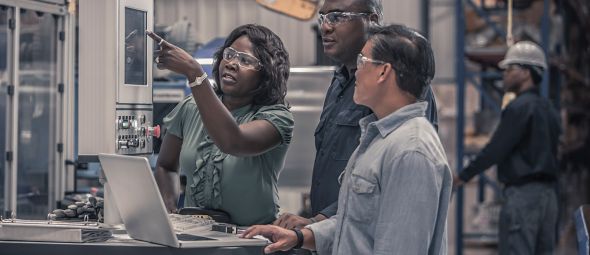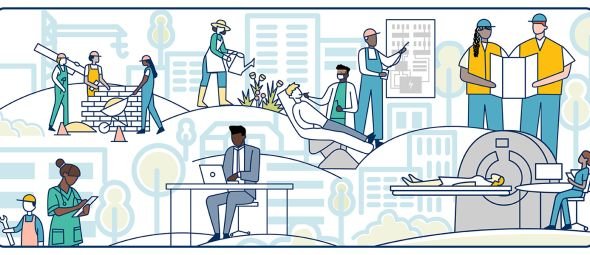Overview
People’s access to opportunity and advancement in the labor market is shaped by macroeconomic forces, technological change, policy choices, and labor market dynamics. Over the past 40 years, these influences have culminated in greater income inequality and less upward economic mobility for US workers. They have also contributed to a growing share of low-wage jobs in the US labor market. WorkRise generates evidence on and elevates our understanding of how macroeconomic, technological change, policy, and labor market dynamics influence economic security and mobility.
Working Knowledge

Economic context
August 11, 2022
Article
Policymakers Face Trade-offs in Supporting Workers’ Economic Mobility and Protecting Them from Inflation
Mixed signals for the economy and low-wage workers in particular—higher wages but also growing inflation—pose thorny trade-offs for policymakers and raise important questions to be prioritized in future research.

Economic context
May 26, 2022
Article
New Student Research Builds Evidence on Different Dimensions of Inequality
WorkRise grantee, the Opportunity Lab at the University of California, Berkeley, hosted a convening where student researchers shared new work examining historical roots and international examples of labor market inequality.

Economic context
May 26, 2022
Article
New and Noteworthy: Research on inflation’s impact on low-income families, parental labor force attachment, and more
This month’s column shares a new analysis showing recent wage gains by low-income households could not keep up with rising prices. Plus: new studies tracking parents’ employment during the pandemic and recovery and a new measure of systemic discrimination.

Economic context
April 26, 2022
Article
New and Noteworthy: New research on labor market competition, degree resets in job posting, and more
This month’s column highlights a new US Treasury report that finds an insufficiently competitive labor market has given employers market power to lower workers’ earnings.
Research
Economic context
Brief
Last updated on January 14, 2025
Workforce Strategies for New Industrial Policies: Governors’ Emerging Solutions
The report summarizes findings from interviews with 16 governors’ workforce development policy advisers in states that vary in terms of their political leadership, geographies, and populations.
Grantee Research

Economic context
Last updated on July 09, 2024
Expanding Worker Opportunities Through Evidence: WorkRise Impact Report 2023
By bridging knowledge gaps and forging multi-stakeholder partnerships among employers, worker advocates, policymakers, and practitioners, WorkRise is meaningfully improving economic mobility for lower-wage workers. Our 2023 Impact Report shares more about how we lead with rigorous yet actionable research and get it into the hands of the change makers best positioned to act on it.
Last updated on July 09, 2024
Economic context
Report
Last updated on May 14, 2024
Aligning Workforce and Economic Development to Benefit Workers
In this report, WorkRise examines what we know about the impacts of the workforce development and economic development fields and their implications for equitable economic outcomes for low-wage workers, especially Black individuals and other people of color who have faced systematic challenges in economic mobility.
WorkRise Research
Economic context
Report
November 20, 2023
Quantifying the Costs of Rising Unemployment
Rising unemployment brings significant costs to workers, their families, social outcomes, and the economy at-large. The contemporary tight labor market provides a good opportunity for researchers to better understand the benefits of low unemployment and thus the risks of high unemployment.
WorkRise Research

Economic context
Infographic
September 12, 2023
Leveraging Federal Funds to Create Quality Jobs
Do you want better jobs for your community? Through new federal dollars, state and local policymakers have a once-in-a-generation chance to build a new and thriving workforce.
WorkRise Research